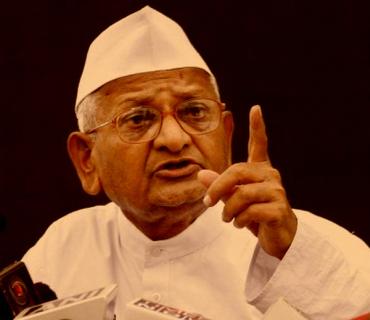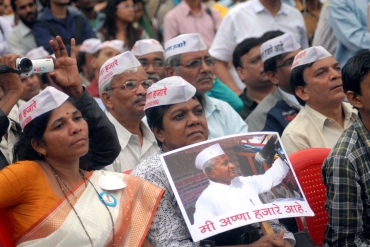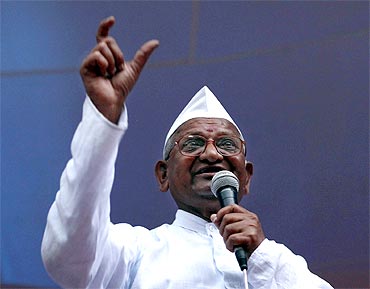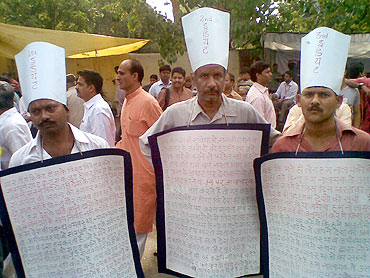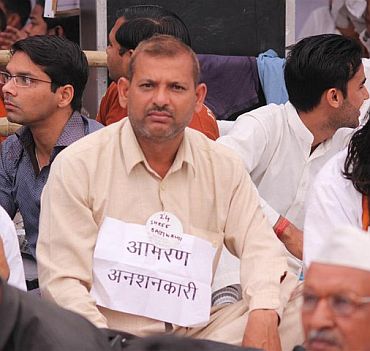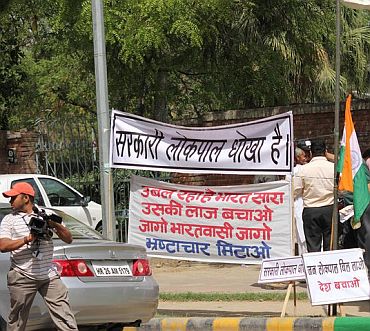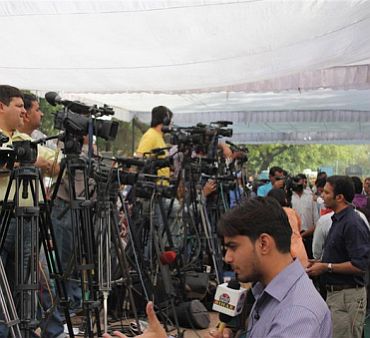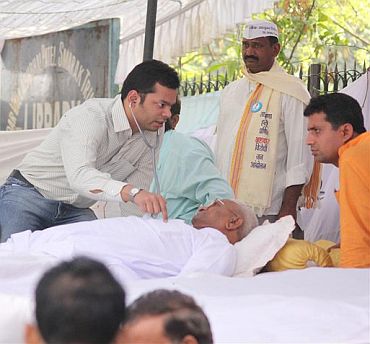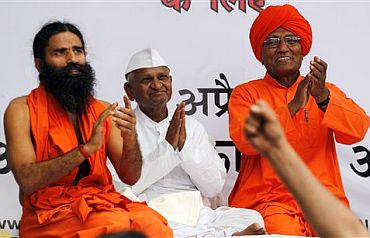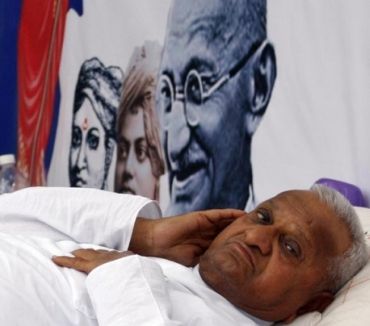 | « Back to article | Print this article |
6 lessons from brand Anna for marketers
In a recent survey, leading marketing and advertising professionals hailed the anti-corruption campaign led by Baburao Hazare as a favourite.
It successfully competed against the usual favourites like Vodafone's "Zoozoos", Cadbury's "shubh aarambh", Airtel's "friends", Pepsi's "change the game", among others.
This, at one level, shows that professionals are also citizens and relate to these issues. However, there is, subliminally, admiration for how the Hazare campaign was executed.
This can be instructional for branding and brand communication in the future. First, the campaign was based on a larger cause: a purpose that was both current and real.
Click NEXT to read more...
6 lessons from brand Anna for marketers
Though corruption has been an issue in India for decades, the spate of scams in the last one year has made the issue "hot" today. And the campaign brought that out in the open.
Second, there was an immediate milestone that had to be achieved. It opened with the demand for passing the Jan Lok Pal Bill. The acceptance of the civil society's version of the Bill was clearly seen as a step forward. It had a start and an end date.
Third, the movement had distinct symbols, role models and rituals -in short, it had all the essentials of a strong brand.
Click NEXT to read more...
6 lessons from brand Anna for marketers
Hazare had established himself in the target audience's consciousness with his earlier fast and was now a known face people were ready to rally around.
A 74-year-old soldier who has led an austere life fighting for various causes makes a good role model.
Linked with the symbol of the topi - the white cap - reminiscent of the freedom struggle and the ritual of a fast - again harking back to the British era - the movement had all the right ingredients to stir emotions and create connections.
Click NEXT to read more...
6 lessons from brand Anna for marketers
Fourth, it was an integrated campaign: online and on ground. Technology was used to reach the influencers and an on-ground event was used to galvanise people to have a taste of the real thing.
While the online movement created a buzz, the on-ground one created a real experience. The on-ground event had both entertainment and celebrities, besides a "fasting" Hazare, to provide enough fodder for media coverage and engagement for attendees. That was smart.
Fifth, the media was enlisted as a target audience and not just as a channel. The organisers of the movement understood that the media today needs content and TRPs.
Click NEXT to read more...
6 lessons from brand Anna for marketers
The cause, the milestone and the traditional brand trappings provided enough stimuli for the media to get excited about providing free mileage for the movement.
This is certainly a departure from traditional communication exercises which see the media as only a means of dissemination.
Finally, it was interesting to note that many people who attended the rally were not conversant with the finer details of the Jan Lok Pal Bill, nor did they know how it was different from the government's version.
Click NEXT to read more...
6 lessons from brand Anna for marketers
However, given the stature of the role model - Hazare - and the support the movement got from other credible celebrities - Aamir Khan for instance - people were willing to accept, rather blindly, the "citizen" version was superior to the one already proposed in Parliament by the government.
This is quite insightful, clearly revealing that reaching out to innovators and opinion leaders is enough to get the masses and followers to join the fold.
Everyone doesn't need to understand the fine print to support a "good" cause.
Click NEXT to read more...
6 lessons from brand Anna for marketers
I accept that there is a difference between a mass movement, which needs no financial commitment from an individual, and a product campaign urging people to fork out money to buy a final product.
However, even the Hazare movement expected people to spare some of their time – a scarce resource - to either come out and be at the venue or watch news on television.
Many viewers across India wholeheartedly traded their "entertainment" time to follow Hazare's fast on TV.
A movement with a physical manifestation only in Delhi managed to get fairly high "physical" engagement with people across at least top 10 cities in India.
Click NEXT to read more...
6 lessons from brand Anna for marketers
Causes work. NDTV over the last couple of years has been able to raise crores of rupees for causes as diverse as lighting villages to saving the tiger to a school programme through its talkathons.
Clearly, there is an opportunity for product branding to shift gear from "propositions" to "purposes" to connect with consumers.
A "purpose" provides a platform for brands to engage with consumers and create a buzz that can involve the media (including new media correspondents like bloggers) to become carriers of the message.
It means clearly marking the channel as a target audience and understanding what tickles them as much as what tickles the end consumer while developing brand campaigns.
Click NEXT to read more...
6 lessons from brand Anna for marketers
This could also mean that there is no need to do carpet bombing and convince all prospective buyers; aiming at a select few in the innovator segment and using them (and the media) to amplify the brand message to create action can suffice.
Many integrated campaigns showcased in Cannes reflect some of these new branding principles. Yellow Pages' "Tree house restaurant", Volkswagen's "Fun theory" promotion or Gatorade's "Replay" campaign may sound small in scale if measured by the direct reach, but if the buzz value is factored in, the impact of these campaigns would be tremendous.
And if the buzz comes from a third party, it adds weight to the impact of messaging.
Click NEXT to read more...
6 lessons from brand Anna for marketers
This could also provide a great way to differentiate a brand with a "purpose" from one with a "proposition".
A brand with a point of view on the world or life could provide a connect at a higher level than just providing a strong emotional benefit.
All the same, in today's busy life, it is important for Hazare to constantly remain relevant to ensure that the cause and the issue stay alive both in the minds of the country's citizens and lawmakers.
Given that marketing is quite persistent in its efforts, the transience of the Hazare campaign is irrelevant to the world of branding.
Views expressed are personal
madhukar.sabnavis@ogilvy.com
